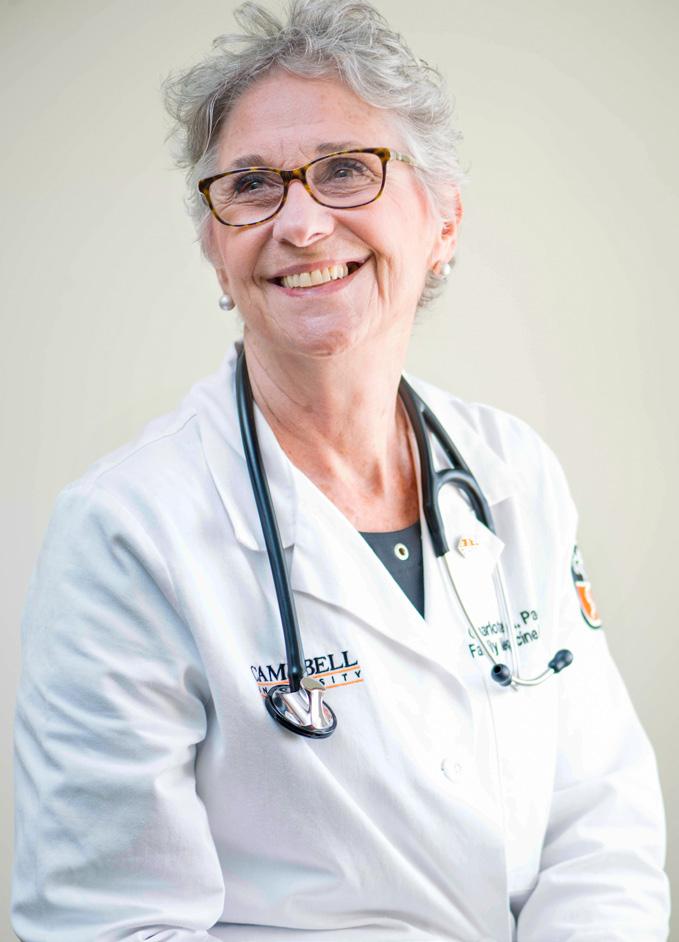
3 minute read
Campbell Medicine Special Highlight: Dr. Charlotte Paolini announces retirement
The Campbell Medicine Community gathered virtually to celebrate the retirement of Charlotte Paolini, DO, on October 12, 2020.
The Campbell Medicine community gathered virtually to celebrate the retirement of Charlotte Paolini, DO, on October 12, 2020. Dr. Paolini joined the medical school faculty in 2013 as the founding Chair of Family Medicine. In 2017, she became the Director of Geriatric Medicine.
Advertisement
Throughout her years of service and teaching at CUSOM, she regularly treated patients at the Campbell University Health Center, and she mentored and taught students overseas on CUSOM medical mission trips and through local migrant farmworker evening clinics. As a member of the Christian Medical and Dental Associations, Dr. Paolini helped establish a student CMDA chapter with about 40 students from the inaugural Class of 2017.
As the founding Chair of Family Medicine, Dr. Paolini was also the faculty advisor for the student run free clinic. She was instrumental in the development and founding of the clinic, which was later named Campbell University Community Care Clinic (CUCCC). The CUCCC offers free medical care to local underserved communities.
“[The CUCCC] has been a wonderful place to serve and a wonderful place to teach,” said Dr. Paolini. “It is very missional, and that is my heart. It was just a huge blessing to be able to be part of that. I loved going on mission trips, and I really feel like of all the things we did and do at Campbell are missional, but the free clinic has really found a place in the community. It provides a service that nobody else does and is part of the fabric of healthcare in Harnett County.”
For the last several years, Dr. Paolini has served as the Director of Geriatric Medicine at CUSOM. As the Medical Director at Emerald Health and Rehab Center, she developed a geriatrics practice and training program and worked with 3rd & 4th year medical students and residents.
“The geriatrics clerkship at Emerald with the students and residents was great fun, enormously successful and very rigorous, but also very satisfying,” she shared. “That is a place where I really believe God has gifted me. Problem-based learning [one-on-one with patients at the bedside] – it’s just part of who I am, how I practice and how I teach.”
Dr. Paolini has worked in healthcare for over 50 years. Her passion for helping and serving people was realized at a young age, and her medical education began with nursing school in 1969. She thrived in nursing school – becoming both the class president and student nurse of the year – and continued on a few years later to become a nurse practitioner. That’s when she fell in love with family medicine and outpatient care.
As her career continued, she began to look at education and academia and eventually took a position at Southern Illinois University School of Medicine. There she taught geriatrics to students and residents, which really sparked her passion for geriatrics. While at SIU, she had the opportunity to work alongside Dr. Howard Barrows and began learning more about medical education, curriculum design, and problem-based learning. Her experiences at SIU led her to pursue her early dream of becoming a physician.
“I was very blessed to get into medical school [at the University of New England] and knew that I wanted to do family medicine,” shared Dr. Paolini. “Even as a student, I did a lot of teaching and brought problem-based learning to the UNE Medical School curriculum and helped create their simulated patient program.”
After medical school, she worked in both academia and private practice. She spent several years as the director of the geriatrics programs at both The University of New England and Nova Southeastern University College of Osteopathic Medicine prior to coming to CUSOM. Although retiring, Dr. Paolini's passion for learning and teaching continues.
“My concern presently is for our changing culture," said Paolini. "As Christian physicians, our right of conscience is being severely tested and challenged. I'm eager to look at culture from a Christian perspective and to assist healthcare professionals in knowing how to interact with the culture from that perspective. We need to defend our Christian world view and stand strong in that in a way that’s loving, kind and generous.”
- SHELLEY HOBBS








